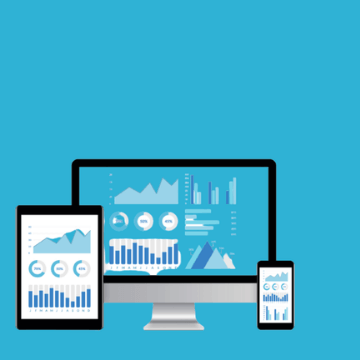
If there was a tool that could help your attraction make smarter decisions that drive revenue, wouldn’t you want to know about it?
Business intelligence tools empower attractions to take their valuable company data into their own hands — and make better decisions based on that data. These tools can help you gain insight into your market and improve your guest experience, without necessarily having to hire an analyst to sift through all your data.
In this post, you’ll learn what is a business intelligence reporting tool and how to choose the best one for your needs.
What is business intelligence?
What’s the difference between business intelligence and business reporting?
How does the BI reporting process work?
How to choose the right BI reporting tool
- 1. Does it integrate with your existing tools?
- 2. Is it user-friendly?
- 3. Does its reporting capabilities meet your needs?
- 4. Is it easy to share and collaborate?
- 5. What does security look like?
- 6. How much will this cost?
What is business intelligence?
Business intelligence (a.k.a. BI) is an umbrella term that refers to the processes of collecting, storing, and analyzing your attraction’s data.
The purpose behind BI is to convert raw data into meaningful information that’s easy for you and your team to understand. Then, your company can use this data to make better business decisions — such as hiring a new tour guide or adjusting your prices.
BI metrics can include everything from sales revenue to customer churn and retention.
A company that has access to this information has a much better understanding of how the business is doing as a whole than one that’s operating blindly.
For example, Delta Airlines uses BI to increase customer satisfaction through initiatives like allowing guesrs to track their baggage from their smartphones. Meanwhile, Disney personalizes every aspect of a park visit through internet-connected bracelets that track a guest’s location and behavior inside the park.
What’s the difference between business intelligence and business reporting?
While reporting plays a key role in business intelligence, there’s a distinction between the two terms.
Reporting shows a company what has happened in the past and what the current status of your company is. Reports typically focus on a specific operation or data set for a period of time, such as your attraction’s quarterly booking volume.
BI takes multiple sources of data into account to show you why things happen. Oftentimes, BI looks at multiple sources of data to discover trends that can help you improve your business operations.
It also helps businesses differentiate between causation and correlation. Causation implies that a specific action or aspect of your business causes an outcome. Correlation, on the other hand, means that the factors relate to one another but one doesn’t necessarily cause the other to happen.
Let’s say you launched a new ride or tour. Soon after the launch, your bookings start to increase. This might lead you to believe that the new ride or tour is attracting more guests.
But once you use BI tools to take a look, you find out that a new marketing campaign that offers discounted tickets on your website is the reason for the increase. Therefore, the rise in bookings was not caused by the new addition, but rather a great campaign.
The more you understand what’s actually going on in your company, the better you’ll be able to focus on the initiatives that bring in more revenue.
How does the BI reporting process work?
Companies typically invest in software to reap the full benefits of business intelligence. Instead of manually collecting, organizing, and interpreting your company data, a BI tool will automate the process for you.
Reporting tools allow you to create reports on specific metrics, such as one solely dedicated to customer satisfaction or booking volume over time. You’ll also be able to create custom dashboards where you can monitor these metrics in real-time.
You’d then use this information to guide your business decisions. If you want to identify new ways to bring in more revenue from your tour business, for instance, a BI tool can help you do that.
BI reporting also involves sharing data with the rest of your team. The goal is to provide them with information that helps them do their jobs in the best way. Your marketing department, for instance, could benefit from accessing data about your previous marketing campaigns and conversions.
What is a BI reporting tool?
Reporting tools are meant to make your job easier. The main purpose of a BI reporting tool is to provide businesses with quick and easy access to insights about their company’s current state.
It’ll present you with a full picture of your attraction based on the data available. BI software can pull and process all of your attraction’s data, including sales revenue, booking volume, customer satisfaction feedback, etc.
The best booking softwares have BI reporting capabilities. Xola, for instance, provides a number of BI reports that can be used to increase revenue and improve the guest experience.
The benefit of using a booking software for BI reporting is that you won’t need to invest in a third-party tool. When it comes to training staff, you can show them how to manage bookings and BI reporting in a single software.
BI tools allow you to share relevant data with the rest of your team in the form of action-oriented reports. You can also present findings in the form of summaries, dashboards, graphs, charts, or maps that illustrate how your business is performing.
With a BI reporting tool, you also make valuable data accessible to the rest of your team. Your reports and dashboards can be shared with relevant departments and employees so that they too can make the decisions based on real data.
How to choose the right BI reporting tool
Investing in new technology for your company is a big decision. While there are a lot of BI tools available, you should carefully research each one before choosing one. You want to ensure that your tool meets your company’s needs.
Here is what to look for when shopping for a BI tool.
1. Does it integrate with your existing tools?
This is one of the first questions you want to ask yourself before investing in a BI tool. Your tool should be compatible with your existing technology, such as your email automation software and booking platform.
That way, you can seamlessly retrieve and sort data from multiple locations and sources.
You may want to consider a booking software that comes with BI reporting capabilities like Xola. Keeping your operations within a single software can simplify employee training, onboarding, and data sharing.
2. Is it user-friendly?
Your BI tool should be easy for your employees to use, even if they’re not very tech-savvy. Ideally, your team should be able to create reports and dashboards on their own. If you’re leaning toward a more advanced tool, consider how long it’ll take to train your team to use the new tool and whether that time is worth the additional features.
3. Does its reporting capabilities meet your needs?
Consider what metrics you’ll be tracking with your BI tool and how you plan to apply this data. Then, make sure the tool has all the reporting capabilities and product features to meet that. If you define your BI objectives beforehand, you’ll be better equipped to find the tool that’ll meet those needs.
4. Is it easy to share and collaborate?
The tool should make it easy for you to share information with the rest of your company. It should also have collaborative capabilities so that team members can work on charts and dashboards together.
5. What does security look like?
It’s important to research the BI tool’s security processes. Learn about the way the tool handles the accessing of reports and data metrics within your reports. You want to ensure that the right people have access to the right information.
6. How much will this cost?
Consider the full cost of the tool. How much will it cost to implement this tool and how long will it take to train your staff on it? Make sure the new tool fits within your budget.
***
Implementing new technology can always seem a bit overwhelming, but when it comes to BI, the benefits outweigh negatives. Being able to interpret and analyze data will help your attraction better compete with your competitors and attract more guests to your venue.





